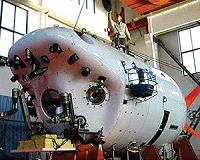 |
Dubai, United Arab Emirates (UPI) Sep 3, 2010 The apparently failed seaborne attack, possibly by al-Qaida, on a Japanese supertanker in the Persian Gulf in July is ringing alarm bells in the energy industry. Security chiefs fear it could be a precursor of an assault on the region's oil centers and the choke point Strait of Hormuz, the only way in and out of the gulf, if Iran is attacked. The tanker, the 160,200-ton M. Star, was damaged by a mysterious explosion July 28 as it sailed through the strait bound for Japan with a cargo of United Arab Emirates oil. Emirates officials said the vessel had been hit by an explosives-laden craft. A small boat had been spotted near the tanker shortly before the blast. A group calling itself the Brigades of Abdullah Azzam, a jihadist ideologue who mentored Osama bin Laden, claimed responsibility. If that claim is true, the attack on the M. Star would be the first terrorist strike in the strategic strait. But worse than that, the tanker was hit when it was northeast of the border between Yemen, the current epicenter of al-Qaida operations in the Arabian Peninsula, and Oman, which has never before figured in al-Qaida operations. Paul Rogers, a security analyst and professor of the Department of Peace Studies at Britain's Bradford University, said, if the claim of responsibility was correct, that suggested al-Qaida "might now also be active in the United Arab Emirates or Oman an unpleasant surprise for gulf security officials." Following the M. Star incident, Rogers said, "The activities of the U.S. Navy in both the Persian Gulf and the Strait of Hormuz will almost certainly be expanded The supertanker incident may prove to be a warning shot." To some extent the theory that al-Qaida was behind the attack has been bolstered in recent weeks with reports that Iran, facing possible attack by the United States or Israel -- or both -- is collaborating with the jihadists, despite the religious rift between Shiite and Sunni Muslims. Tehran was warned it will close Hormuz if Iran is attacked. That would cut off much of the world's oil supplies, send prices through the roof and cause immense economic damage globally. Al-Qaida has a record of hitting energy targets in the region. Seaborne suicide bombers badly damaged the American destroyer USS Cole in Aden harbor in Yemen Oct. 12, 2000, and damaged the French supertanker Limburg in the Gulf of Aden Oct. 6, 2002. Lebanon's Hezbollah severely damaged an Israeli corvette, the Hanit, in the Mediterranean in their 2006 war with an Iranian-built C-802 anti-ship missile fired from shore. During the 1980-88 Iran-Iraq war, swarms of Iranian speedboats armed with 20mm cannon and rocket-propelled grenades repeatedly attacked foreign tankers carrying Iraqi oil exports. Kuwait's state security announced in August 2009 that it had thwarted a plot to blow up the emirate's Shuaiba refinery. On April 19 this year, Saudi Arabia's Interior Ministry announced rounding up 113 suspected al-Qaida operatives it said were planning suicide attacks on oil installations and security facilities. Similar attacks had been made earlier in neighboring Yemen, the current epicenter of al-Qaida activity in the Arabian Peninsula. It isn't clear whether these are part of a new strategy by al-Qaida to attack energy targets. But in March, Adam Gadahn, the movement's American-born spokesman, called on jihadists to "further undermine the West's already struggling economies." Bin Laden has long advocated attacks on the energy industry and has concentrated largely on Saudi Arabia, whose monarchy he has sworn to overthrow. In October 2003, the Saudis said they thwarted a plot to attack the vast Ras Tanura complex in the gulf, the world's largest oil terminal that transfers 5 million barrels of oil daily, with a 10-man al-Qaida cell. The first major attack on a land-based Saudi installation was made on the oil facility at Yanbu, on the kingdom's western Red Sea coast, May 14, 2004. It failed. But on Feb. 24, 2006, al-Qaida mounted a truck bomb attack on Abqaiq, the largest oil processing facility in the world. The gulf-side complex handles two-thirds of the kingdom's output. Saudi Arabia reported at the time the attack was a failure, claiming the attackers never got past the security fence. But eight months later Saudi sources admitted one truck bomb made it into the complex before exploding.
Share This Article With Planet Earth
Related Links
 China to set up base to tap deep-sea energy: state media
China to set up base to tap deep-sea energy: state mediaBeijing (AFP) Aug 27, 2010 China will build a multi-million-dollar research base on its east coast as it steps up its efforts to search for energy sources and rare earths on the ocean floor, state media said Friday. Engineers have started to design the base, which will cost an estimated 495 million yuan (72.8 million dollars) for the initial construction, the Xinhua news agency reported. The base in the coastal ci ... read more |
|
| The content herein, unless otherwise known to be public domain, are Copyright 1995-2010 - SpaceDaily. AFP and UPI Wire Stories are copyright Agence France-Presse and United Press International. ESA Portal Reports are copyright European Space Agency. All NASA sourced material is public domain. Additional copyrights may apply in whole or part to other bona fide parties. Advertising does not imply endorsement,agreement or approval of any opinions, statements or information provided by SpaceDaily on any Web page published or hosted by SpaceDaily. Privacy Statement |